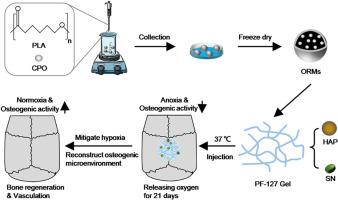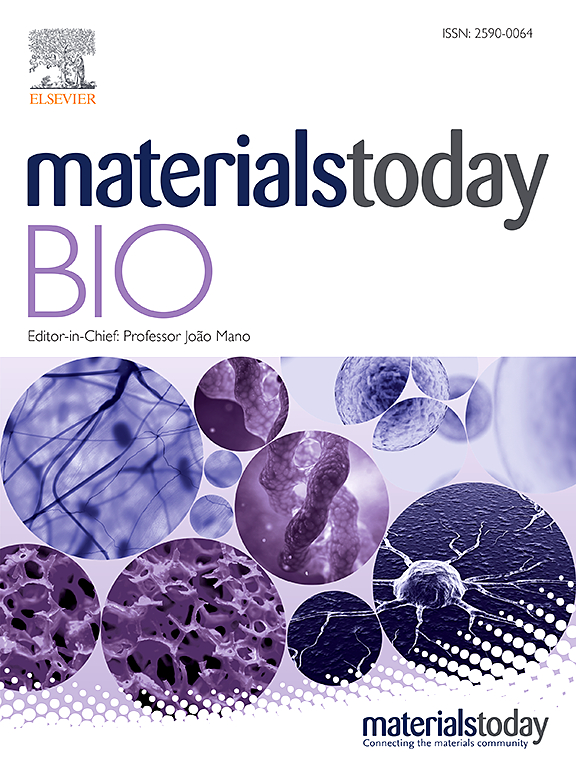Injectable, oxygen-releasing, thermosensitive hydrogel promotes vascularized bone formation with prolonged oxygen delivery and improved osteoinductivity
IF 8.7
1区 医学
Q1 ENGINEERING, BIOMEDICAL
引用次数: 0
Abstract
The failure or delay in healing of critical bone defects is primarily due to early local anoxic conditions and reduced osteogenic activity. In this research, we integrated calcium peroxide (CPO) embedded polycaprolactone (PCL) microspheres and osteoinductive nanoparticles (Hydroxyapatite/Laponite) into a thermosensitive hydrogel (Pluronic F127), thereby formulating an injectable oxygen-releasing osteogenic thermosensitive hydrogel. Notably, the oxygen-releasing microspheres (ORMs) within the composite hydrogel provide stable oxygen release for up to 21 days, ensuring the survival, migration, and bioactivity of both mesenchymal stem cells and endothelial cells under anoxic conditions. Additionally, the composite hydrogel significantly augments the osteogenic potential of bone marrow mesenchymal stem cells by providing a biomimetic microenvironment with the incorporation of nano-hydroxyapatite/laponite. Ultimately, the injectable composite hydrogel successfully stimulated bone regeneration within a cranial defect in a rat model after 8 weeks, with enhanced vascularization and bone quality. The engineered hydrogel provides a minimally invasive approach to stimulate bone regeneration with a sustained oxygen supply and osteogenic microenvironment provision, underlining its potential for treating critical bone defects.

可注射、释放氧气、热敏性水凝胶可促进血管化骨形成,延长氧气输送时间,提高骨诱导性
严重骨缺损愈合失败或延迟的主要原因是早期局部缺氧条件和成骨活性降低。在这项研究中,我们将内嵌过氧化钙(CPO)的聚己内酯(PCL)微球和诱导骨生成的纳米颗粒(羟基磷灰石/皂石)整合到热敏性水凝胶(Pluronic F127)中,从而配制出一种可注射的释氧致骨热敏性水凝胶。值得注意的是,复合水凝胶中的释氧微球(ORMs)可提供长达 21 天的稳定释氧,确保间充质干细胞和内皮细胞在缺氧条件下的存活、迁移和生物活性。此外,该复合水凝胶通过加入纳米羟基磷灰石/皂石提供仿生微环境,显著增强了骨髓间充质干细胞的成骨潜能。最终,这种可注射的复合水凝胶在 8 周后成功刺激了大鼠模型颅骨缺损处的骨再生,并增强了血管生成和骨质量。这种工程水凝胶提供了一种微创方法,通过持续供氧和提供成骨微环境来刺激骨再生,从而凸显了它在治疗严重骨缺损方面的潜力。
本文章由计算机程序翻译,如有差异,请以英文原文为准。
求助全文
约1分钟内获得全文
求助全文
来源期刊

Materials Today Bio
Multiple-
CiteScore
8.30
自引率
4.90%
发文量
303
审稿时长
30 days
期刊介绍:
Materials Today Bio is a multidisciplinary journal that specializes in the intersection between biology and materials science, chemistry, physics, engineering, and medicine. It covers various aspects such as the design and assembly of new structures, their interaction with biological systems, functionalization, bioimaging, therapies, and diagnostics in healthcare. The journal aims to showcase the most significant advancements and discoveries in this field. As part of the Materials Today family, Materials Today Bio provides rigorous peer review, quick decision-making, and high visibility for authors. It is indexed in Scopus, PubMed Central, Emerging Sources, Citation Index (ESCI), and Directory of Open Access Journals (DOAJ).
 求助内容:
求助内容: 应助结果提醒方式:
应助结果提醒方式:


